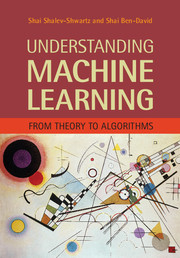Book contents
- Frontmatter
- Dedication
- Contents
- Preface
- 1 Introduction
- Part 1 Foundations
- Part 2 From Theory to Algorithms
- Part 3 Additional Learning Models
- 21 Online Learning
- 22 Clustering
- 23 Dimensionality Reduction
- 24 Generative Models
- 25 Feature Selection and Generation
- Part 4 Advanced Theory
- Appendix A Technical Lemmas
- Appendix B Measure Concentration
- Appendix C Linear Algebra
- References
- Index
21 - Online Learning
from Part 3 - Additional Learning Models
Published online by Cambridge University Press: 05 July 2014
- Frontmatter
- Dedication
- Contents
- Preface
- 1 Introduction
- Part 1 Foundations
- Part 2 From Theory to Algorithms
- Part 3 Additional Learning Models
- 21 Online Learning
- 22 Clustering
- 23 Dimensionality Reduction
- 24 Generative Models
- 25 Feature Selection and Generation
- Part 4 Advanced Theory
- Appendix A Technical Lemmas
- Appendix B Measure Concentration
- Appendix C Linear Algebra
- References
- Index
Summary
In this chapter we describe a different model of learning, which is called online learning. Previously, we studied the PAC learning model, in which the learner first receives a batch of training examples, uses the training set to learn a hypothesis, and only when learning is completed uses the learned hypothesis for predicting the label of new examples. In our papayas learning problem, this means that we should first buy a bunch of papayas and taste them all. Then, we use all of this information to learn a prediction rule that determines the taste of new papayas. In contrast, in online learning there is no separation between a training phase and a prediction phase. Instead, each time we buy a papaya, it is first considered a test example since we should predict whether it is going to taste good. Then, after taking a bite from the papaya, we know the true label, and the same papaya can be used as a training example that can help us improve our prediction mechanism for future papayas.
Concretely, online learning takes place in a sequence of consecutive rounds. On each online round, the learner first receives an instance (the learner buys a papaya and knows its shape and color, which form the instance). Then, the learner is required to predict a label (is the papaya tasty?). At the end of the round, the learner obtains the correct label (he tastes the papaya and then knows whether it is tasty or not).
Information
- Type
- Chapter
- Information
- Understanding Machine LearningFrom Theory to Algorithms, pp. 245 - 263Publisher: Cambridge University PressPrint publication year: 2014
Accessibility standard: Unknown
Why this information is here
This section outlines the accessibility features of this content - including support for screen readers, full keyboard navigation and high-contrast display options. This may not be relevant for you.Accessibility Information
- 2
- Cited by
